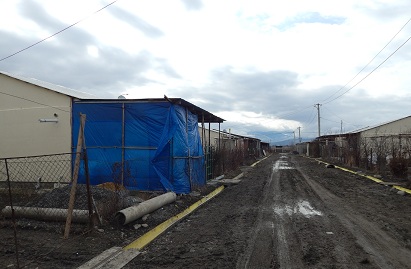Natia Gogolashvili
White (9-years-old) cottages, school, kindergarten, which is only 2-years-old, destroyed roads are in the Berbuki IDP settlement where hundreds of IDP families have been living for 9 years already; they are waiting for the answer to the question – who is guilty in the war crimes committed during the 2008 August War. Before the International Criminal Court (ICC) answers their main question, the IDPs recall the days of the August, 2008 with humanrights.ge. It is very hard for them to recall those days though cannot forget either.
Considering the interests of the victims, we do not publish their full names.
“I milked the cow and put the bucket on the table in the kitchen. I could not even change the cloth and had to flee in the cloth I wore in the cattle-house,” an IDP woman from Tamarasheni village recalled. She fled from the village on August 8, 2008. As she said the entire gorge got empty on August 8 because there was threat of bombing. “We lived well in Tamarasheni. We had a two-story house, two cars; cattle, poultry but left everything and ran away. We did not take anything. We fled with empty pockets,” the IDP woman said.
On August 9, 2008, Kh.Sh’s husband lost relatives during the bombardment of Kombinati settlement in Gori. Among them were his mother and 13-years-old child, who was their relative. He recalled how he found the parts of the bodies of the killed relatives. “We found half of my mother’s body; three legs, one arm and flash. I took them from Tamarasheni village but were killed in Gori. I am very hurt but what I can do with it. I am not alone with this tragedy.”
IDP E.B from Achabeti village: “There were intensive shootings in August of 2008. However, it was not that intensive in our gorge; mostly the Georgian side was under attack. On August 8, it became already absolutely impossible to stay there; the Russian aviation flew into our territory suddenly. What I had earned during all my life, I left there. I could not take anything from home. We had a good house, cars, plots; I owned almost one and half hectare of fruit-garden. I had a farm: cattle and poultry.”
IDP L.Sh’s husband stayed in Disevi village for another one month after the war started; he was taking care of the cattle. “[Finally,] the cattle was stolen and then they came to burn the house. They lied to him and asked to go far from the house. He was looking at our burning house from distance. He stayed in the burnt house until the end of August. Then they came to burn the house of our neighbor E.O; he resisted but the looters killed him in front of the house; then burnt the house. They were not afraid of anything; they were stealing everything,” the IDP woman said.
When E.O’s house was burnt, IDP G.O was in Disevi village. “Initially they burnt E.O’s house. He said, I will not allow you to burn my house but they immediately shot him. Then the neighbors buried him in secret, in the garden,” E.P said. He eye-witnessed many crimes that were committed during the August war.
“4-5 people were coming to burn the houses. When they were done with all other houses, they came to my house. I told them I could not go anywhere. They said it is no longer your house and started beating me; I lost conscious. My wife was asking them not to kill me; she said she had saved many Ossetian people having worked as a medical nurse in the hospital but they did not care. They beat her too. Neither they cared about ethnicity of my mother (she was also Ossetian) and insulted me. I could not stand beating, fell down and lost conscious. When I recovered, I found my wife burnt in our house. I kept her body during 3 days. Then with the support of my neighbors, who were still in the Gorge, I buried her without coffin in our garden,” IDP G.O said.
There are many stories about human and material losses. Many IDPs do not want to recall their tragedies at all because they have lost all hopes. They have lost hope that something will change and somebody will be punished, or their loss will be compensated. However, regardless that, each of them are ready for cooperation with the investigation.
“Many victims of the August 2008 War do not have official victim status. Human Rights Center provides them with legal aid and represents them in front of local law enforcement institutions and International Criminal Court. Human Rights Center visits the IDP settlements in the frame of these activities. During visits we have opportunity to study social-economic problems of the victims. It should be noted that living conditions in Berbuki settlement are very grave. The roads in the settlement are in horrible conditions. The walls and floors of the cottages are damp that creates serious problems for the health of the IDPs. Human Rights Center calls on the Government of Georgia to pay attention to the hard living conditions of the victims of the August 2008 war and work on the elimination of their problems,” co-director at Human Rights Center Nino Tsagareishvili said.
International Criminal Court is investigating the alleged war crimes and crimes against humanity committed during the August 2008 War in Georgia. The Court, in October 2015, finalized preliminary investigation and commenced actual investigation process. Soon, the Court plans to open outreach offices in Georgia.
News
December 13, 2023
Ethnic minorities outside the peace dialogue
November 6, 2023
‘Peace’ agenda of political parties
Popular
Articles
February 13, 2024




